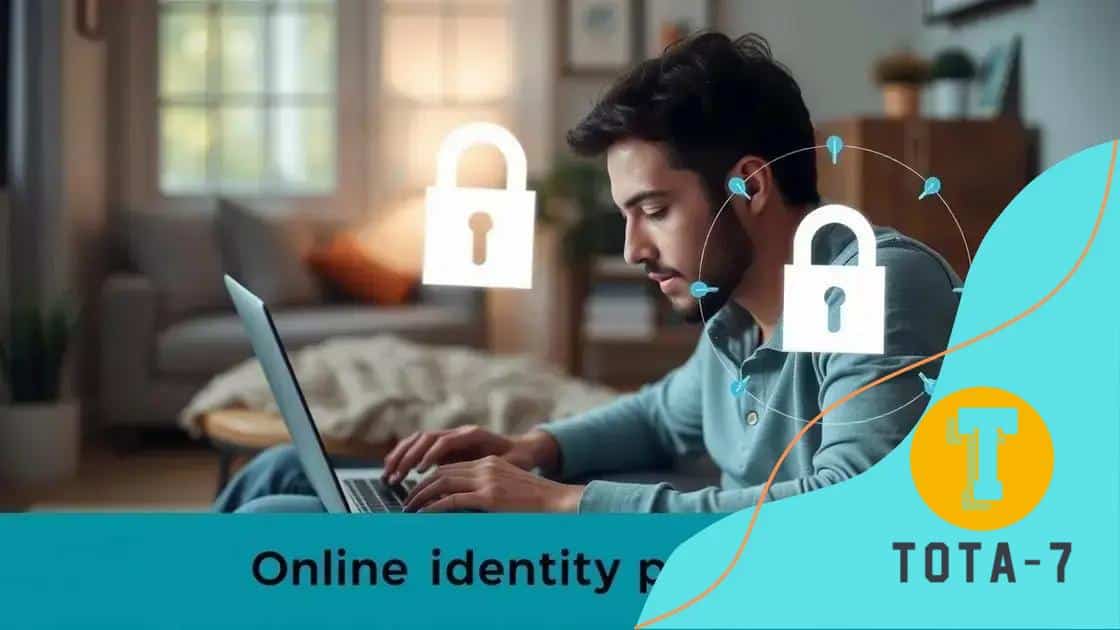Voice cloning scams prompt new security standards

Voice cloning scams prompt new security standards, requiring consumers to adopt measures like two-factor authentication and awareness of privacy regulations to protect their personal information effectively.
Voice cloning scams are on the rise, putting many at risk of identity theft. With advancements in AI, the ease of replicating voices has increased. What does this mean for your personal security and how can you stay protected?
Understanding voice cloning technology
Understanding voice cloning technology is essential as it becomes increasingly prevalent in various industries. This technology allows the replication of a person’s voice using artificial intelligence. It raises both exciting possibilities and significant concerns.
How Voice Cloning Works
Voice cloning uses a method called deep learning, which mimics the way humans learn. By analyzing extensive voice samples, AI algorithms can produce outputs that sound remarkably similar to the original voice. These systems require input data, such as recordings of the target voice, for effective training.
Common Applications
- Entertainment: Used in movies and video games to create voiceovers.
- Telecommunications: Enhances realistic customer service interactions.
- Accessibility: Helps individuals with speech impairments communicate more effectively.
As we delve deeper into the capabilities of voice cloning, it is important to consider its impact on personal security. While it opens doors for innovation, it also presents risks. Criminals can potentially misuse this technology for identity theft or impersonation.
Voice cloning can be both a tool for creativity and a weapon for deceit. Staying informed about advancements and understanding potential threats is vital for everyone. As this technology evolves, so must our awareness and response to its uses.
Identifying common voice cloning scams

Identifying common voice cloning scams is crucial in today’s digital age. As technology advances, so do the methods used by scammers to exploit unsuspecting individuals. Voice cloning can be manipulated to create convincing impersonations, leading to various types of fraud.
Types of Voice Cloning Scams
There are several prevalent scams involving voice cloning techniques. Recognizing them early can save you from significant losses.
- Impersonation Calls: Scammers may use cloned voices to impersonate a friend or relative, often requesting money or sensitive information.
- Fake Customer Service: Fraudsters can use cloned voices to mimic legitimate companies, tricking customers into sharing personal details.
- Fraudulent Investments: Voice cloning technology might be used to create fake endorsements from well-known figures, luring victims into shady investment schemes.
Awareness of these scams helps in taking preventive measures. If someone calls asking for money or sensitive data, be cautious. Always verify their identity through another method, such as a text message or an official email.
Additionally, it’s wise to stay informed about the latest security practices. Regularly update your passwords and use multifactor authentication wherever possible. These strategies can mitigate the risk of falling victim to such scams.
Being proactive about recognizing potential scams can help protect you and your loved ones from financial harm. Trust your instincts; if something feels off, it’s worth investigating further.
New security measures for consumers
New security measures for consumers are essential in the fight against voice cloning scams. As these threats evolve, companies and individuals must adapt to protect sensitive information. Learning about these measures will help you stay safe in an increasingly digital world.
Two-Factor Authentication
Implementing two-factor authentication (2FA) is one of the best ways to enhance security. This process requires not just a password but also a second form of verification, like a text message code or an authentication app.
Voice Recognition Technology
Many companies are now using advanced voice recognition technology to verify identities. This means that even if a scammer uses a cloned voice, their inability to match specific vocal characteristics can help prevent fraud.
- Multi-Layer Security: Combine different security features, such as biometrics and passwords, for stronger protection.
- Regular Security Updates: Keep software and applications updated to the latest versions to patch vulnerabilities.
- Monitor Account Activity: Regularly check bank and credit card statements for suspicious transactions.
Education is another powerful tool. Consumers should be informed about the risks associated with voice cloning. Recognizing warning signs can help mitigate potential threats.
For instance, be wary of unsolicited calls asking for personal information. If something seems unusual, double-check before proceeding. Staying informed about scams can empower consumers to make safer decisions.
Tips to protect your identity online

Protecting your identity online is essential in the age of digital communication. Scammers are continually finding new tactics, making it crucial for individuals to stay vigilant. Simple actions can make a significant difference in safeguarding your personal information.
Use Strong Passwords
One of the first steps in protecting yourself is to create strong passwords. A good password should be hard to guess and include a mix of letters, numbers, and symbols.
Enable Two-Factor Authentication
Adding an extra layer of security, like two-factor authentication, can help secure your accounts. This feature requires another form of verification, making unauthorized access much more challenging.
- Don’t Share Too Much Information: Limit what you share on social media platforms, as this information can be used against you.
- Be Wary of Public Wi-Fi: Avoid accessing sensitive accounts over public Wi-Fi networks, as they can be less secure.
- Regularly Monitor Accounts: Keep an eye on your bank and credit card statements to detect any unauthorized activity quickly.
Awareness is another critical factor. Knowing the signs of phishing scams can help you avoid falling victim to them. Always check the sender’s email address before clicking on links or downloading attachments. Many scams disguise themselves as legitimate communications from trusted sources.
Lastly, consider using a password manager to keep track of your passwords securely. These tools can store and generate complex passwords for you, ensuring that you don’t have to remember them all. Staying proactive about online security can significantly reduce your risk of identity theft.
The future of voice security and privacy
The future of voice security and privacy is evolving rapidly as technology continues to advance. With the rise of voice cloning, ensuring that our voices are protected is more important than ever. Innovations in security measures are being developed to combat potential threats associated with voice technologies.
Advancements in Authentication
Voice biometrics are becoming a popular method for identity verification. These technologies analyze unique voice traits, which can enhance security. As the recognition systems improve, they will be able to differentiate between genuine voices and clones more effectively.
Privacy Regulations
As voice technology becomes widespread, regulations may evolve to protect consumer rights. Policies may soon require companies to implement specific measures to ensure that users’ voices are not misused.
- Increased Transparency: Companies will need to explain how they use voice data and obtain consent from users.
- Data Encryption: Stronger encryption methods will ensure that voice recordings are securely stored and transmitted, minimizing the risk of breaches.
- User Control: Users may gain more control over their voice data, including the ability to delete recordings and manage permissions.
Another significant aspect is the integration of AI in detecting fraudulent activities. By using machine learning algorithms, systems can analyze voice patterns and flag any inconsistencies that may indicate a scam. These advancements can significantly bolster security efforts.
The outlook is promising, but it still requires awareness from users. As voice technologies become more common, understanding their implications will be crucial in maintaining privacy and security. Adapting to new security measures will be necessary to navigate the evolving landscape effectively.
FAQ – Common Questions About Voice Cloning and Security
What is voice cloning?
Voice cloning is a technology that replicates a person’s voice using artificial intelligence, creating realistic audio that mimics the original speaker.
How can I protect myself from voice cloning scams?
You can protect yourself by using strong passwords, enabling two-factor authentication, and being cautious about sharing personal information over the phone.
Are there regulations regarding voice data privacy?
Yes, as voice cloning technology evolves, new privacy regulations may emerge to protect consumers’ rights and ensure secure handling of voice data.
How can I stay informed about voice security threats?
Regularly checking news updates, following cybersecurity blogs, and participating in online security forums can help you stay informed about the latest threats and solutions.





